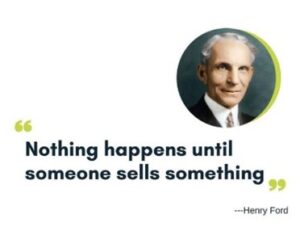Just how to keep them motivated

Selling. Perhaps THEE oldest profession. The Serpent selling Eve, then Eve putting the hard close on Adam to “Just try this free Apple sample”. And he bit! Guys are such pushovers.

Quite true. You can have all the processes and procedures in place a company could want. The manufacturing to rapidly produce an excellent product, and the logistics to get it to market. But without a sale, it’s all just window dressing. Of course, the other parts of the machine matter, but this is about selling. So, feel free to write your own blog…
Manage – verb
: to handle or direct with a degree of skill: such as
a
: to exercise executive, administrative, and supervisory direction of
A verb is an action word. Sales Management should be an action position. Far too many “managers” simply don’t manage. And they rarely, if ever, motivate. Think of a playground supervisor. They really don’t want to be there, they don’t teach, train, or motivate the kids to do much except try to prevent Billy from breaking a limb on the Jungle Gym. There are far too many Sales Managers out there who should be retitled, “Sales Supervisor”.

Sales reps almost universally, and most management, have no real idea how true the above statement pertains to being an exceptional sales manager, nor how incredibly hard it is to walk that fine line on a daily basis. Well, and why is that you may ask? Simply because they’ve never been trained or shown how to be an effective sales manager. They may be the best at a trade, skill, or service, but that doesn’t qualify them to be an effective Sales Manager. I’ve been there, done that. Got the T-shirt, accolades, and the failures to prove it.
Take just 2 of many examples, Phil Jackson was a mediocre NBA player, but he was the MOST successful Manager. Magic Johnson was a Hall of Fame player, but terrible as a manager 5 – 11. Being a top sales rep does not qualify you to be an excellent sales manager.
No matter who you are, right now, pause for just a minute, and seriously reflect on your own management style. Or if you’re a rep, the style of your sales manager. How close are you, or they, to that description above?
Seriously, being an S/M is a HUGE responsibility. Whether you have 1 rep, or 100. You must want it and want it bad. Having a PASSION for training people to succeed and managing them for that success should be a prerequisite for the job. If you’re in it just for the prestige or worse, the power, everyone involved will find the road much harder that it needs to be. Turnover typically follows and eventually, the company can fail. I would say most owners can or think they can sell. But I believe the reality is, they may be better suited at administration than the art of sales. That’s not a bad thing, it’s simply realizing where you can best contribute to the company and do that with all your heart. Who knows. As an owner, your real gift might be finding and growing great sales managers!

I have found that often, the S/M doesn’t have a defined “Vision” except to hit their numbers, quota, or profit margins. Then the owner will be happy. Perhaps. But how about he reps? My favorite quote of all time is:
“The main reason things don’t go according to plan is, there never was one.” – DC
If a S/M is managing from the hip, or off the cuff so to speak, reps will likely NOT see a direction or may lose confidence in the direction of the team, manager or company as a whole. That can create a whole new set of problems and concerns. A well thought out plan, executed well, is critical!
A leader takes people where they want to go. A great leader takes people where they don’t necessarily want to go, but ought to be. —Rosalynn Carter
As Rosalynn said, the S/M NEEDS to direct. But not micromanage. With a vision for the team and company clearly drawn out, you can take the sales to new heights, build confidence in the company and your program AND hit all those pesky numbers. It’s not always necessary for your reps to “get” your vision, as it is for them to follow your lead. The more successful your campaign is, the more trust you will build in them following your direction. So, develop that plan (in writing) to take them where they ought to be, not necessarily where they are comfortable.
Imagine just for a moment, what would happen if you CREATED an entire team of reps who were at some point, all qualified to be a Sales Manager on their own…Would some leave? Of course! You’ve trained them to be a Sales Manager. Do you expect your kids to live with you their whole life? Let’s hope not. You raise them up in the way they should go and set them loose on an unsuspecting world to exceed what you’ve done with your life! Expect the same from your professionally trained reps. In this scenario, you are simply the Professor, and you’re creating PhD’s. Well done!
“Every decision a Sales Manager makes either motivates or demotivates their sales team.” – DC
How can you help your Sales Manager be all they can be?
- From an owner’s perspective: Monthly evaluations (quarterly at an absolute minimum) are required. All numbers should be reviewed (budget, sales, profit margins, cost of leads, close rates, etc. AND a review in detail of the Sales Manager’s plan for the company. Is it on track? What’s working, what needs to be changed? How is training going? What tools or support are needed? In what time frame? What are the plans for expansion? Timeframe for that? Etc.
- NOTE TO OWNER: You need to be doing performance evaluations on your Sales Manager AT LEAST every quarter. Or, just leave all the above the that person. Your company, your money, your choice. Don’t know how? Contact us. We’re here to help.
- From a rep’s perspective: The Sales Manager should have regular performance reviews with the reps (see our Module H Sales Rep Performance Review). It is imperative that the S/M asks each rep, “What specifically can I do help you succeed in your position?” And then actually follow up and do it in a timely manner. The rep should be positive and proactive. Go into this conversation with respect and be careful if your S/M sees any critique as condemnation. Resist going over your S/M’s head to upper management (even in companies with an “Open Door policy”) as I have witnessed time and again where the S/M took it as betrayal that didn’t put them in a positive light. Retribution often followed, showing up in less or less qualified leads, the size of the leads, and even the location of the leads.

Here are some attributes of a “Good” Sales Manager. See how you or your S/M stacks up against them, which ones you’d like to shoot for, or just improve on. Feel free to add your own attributes to the list. It’s not meant to be totally comprehensive.
Lead-By example would be best. Participate in the roll play. In the sales process with your reps. Be the example of how it’s done. And give them a role model to emulate!
Direct-You are like an orchestra conductor. Your job is to have a plan or roadmap (the sheet music) so to speak and they are to follow it. You set the tone, mood, and direction of the team.
Train-You will work with reps of various skill levels with different skill sets. Again, your job is to identify areas they need training in, what training they need in those areas and then train them to be as successful as you can make them.
Onboarding-Assessment and training should go on immediately following their hiring. And they should not be selling until they have met your or the company’s required level of skill. (See our Module A-Onboarding)
Sales Meetings-These should be done on a regular basis only if you expect regular improvement. Reps get in a rut. As we all can do. It’s up to you to keep them out of the the rut, or to get them out of it. This is also the time to Motivate them (rah-rah), educate them (PK training) and inform them. New programs, incentives, etc. This is NOT the place to “rip a rep a new one”.
Roll Play-As stated above, the S/M should be a participant in these, not a spectator. The S/M is to show them “How it’s done”. Try difficult scenarios. No one learns by the prospect being a “pushover”. Push them to handle hard people here, and you won’t have them losing as often face to face or over the phone.
Ride-Alongs-Here the S/M is simply a tagalong. NEVER the S/M to the prospect. The S/M is there for support and if need be, assist in closing the sale. The S/M should never take the sale under any circumstances (short of firing the rep on the spot) but allow the rep to get the commission on it. This can create a ton of loyalty.
Critique-There is an extremely old (35 BC) adage the says, “Praise in public, correct in private.” There is an interesting article about doing just the opposite at: www.sharonebardavid.com/2012/01/critical-exception-to-‘correct-in-private’-rule. It’s a good read. And other than the exceptions in that article, I still believe if the S/M has an issue with a rep, dressing them down in front of their peers is NEVER a professional, productive practice. And will lead to the eroding of the culture within the company as a whole.
Praise-Most everyone appreciates genuine, honest praise, and in front of their peers is even better. The exceptional S/M will look for reasons to praise, lift up and reward both individuals as well as the team. As an example, in a team setting, have a banner each time ANY goal is set or broken and give the top rep that month the honor of tearing the old one down and putting the new one up! Just sit back and notice how each rep reacts to the event. At your sales meeting, find reps to praise on anything. Top Sales (of course). Most sales, most appointments ran. Best close rate. Largest single sale. Most referrals, etc. Have a gag gift for the smallest sale…
Support-In your ongoing evaluations, hopefully, you are asking your reps what they need, or think they need from you in order to help them be successful with the full intention of providing them with what they ask for (within reason) and meanwhile, hold them to the results you both agree to if you provide it. A manager who sits back, or is too busy/uninterested or simply doesn’t care “What those babies need”, is just going to sow dissension within the ranks, and will ultimately reap what they sow.
Assist-Goes right along with support. But like a parent, sometimes the kid doesn’t realize just when they need a hand. They might not even know they’re in trouble. It’s the parent’s (S/M’s) job to recognize when a kid/rep needs help and jump in for the assist. Weather that’s in the form of additional ride-alongs, role-play, PK training or whatever. You’re supposed to be the expert here. Call the shot.
Encourage-So, to use the parent simile once again, as the S/M, you are just like the parent at your kid’s soccer or baseball game. Their cheerleader. Their motivator. To everyone there, there is no doubt you are their biggest fan. Everyone needs encouragement at one time or another. Even you. The amount will differ by rep. Your job is to determine how much for each one and when.
Mentor for replacement–
“ Great Leaders Are Always Training Their Replacement”-Forbes
The best companies see that as a great quality in a manager. The weak S/M’s are afraid that they’ll simply be replaced. My recommendation is, if you feel that is truly how the company would respond to you doing that, you are at the wrong company and should develop an exit strategy as soon as possible. You would not be appreciated if that were the case. Aside from that, it is a hallmark of what the top/best companies look for and expect in a manager. What if the company has a plan to promote you to Regional, National level or a VP spot, but they see you can’t get a solid replacement candidate to replace you. Please take a quick look at The Peter Principal here: https://www.mindtools.com/as1yww0/how-to-avoid-the-pitfalls-of-the-peter-principle
All of these traits, if implemented well and consistently, will create quite a return for you, the reps and the company. They are all common-sense, no-nonsense suggestions and ideas. Time proven by likely countless companies larger and more successful than yours. Seriously, give it a try. The choice is yours. It’s always been yours.
Sales a la Carte – “Just the help you need, and nothing you don’t”





